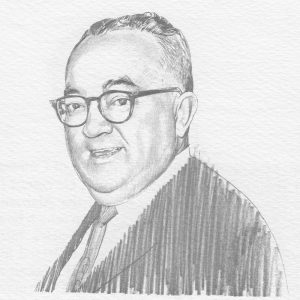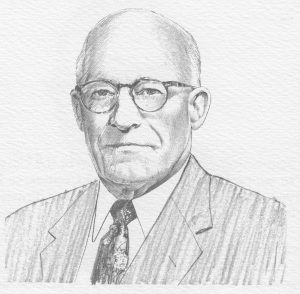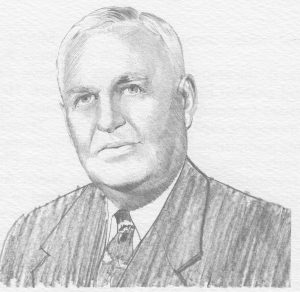Thomas J. Moorer was born in Willing, Alabama (just outside Montgomery) on February 9, 1912, son of Richard Randolph and Hulda (Hinson) Moorer. As a youngster, he was such an excellent student that he skipped several grades and thus was graduated from Cloverdale High School in Montgomery at the age of fifteen.
Having always had a keen interest in the electrical sciences, he had dreamed of attending Georgia Tech to study electrical engineering. But with the onslaught of the Great Depression, he determined that his family would not be burdened with his college expenses. He sought and gained an appointment to the U.S. Naval Academy.
Thomas J. Moorer graduated from Annapolis in 1933. Before the United States entered World War II, he had also completed Naval Aviation Training at Pensacola, Florida. By 1941, Lieutenant Moorer was stationed at Pearl Harbor and was there when the Japanese attacked on December 7.
Early in 1942, the young pilot flew seaplanes with supplies to the beleaguered American troops in the Philippines. Later that year (soon after the American Armed forces had been forced to surrender in the Philippines) Lt. Moorer and his copilot had to ditch their plane in the ocean near Australia, after being attacked by the Japanese. Although Lt. Moorer was wounded, he and his co-pilot survived. On the same day that they were picked up by a Philippine freighter, a torpedo hit the ship. The two Americans once more found themselves on the ocean, this time in a lifeboat with a group of terrified Philippine sailors. Using the Southern Cross as a navigational aid, the wounded lieutenant helped the crew guide the lifeboat to safety on the Australian coast.
Soon afterward, he was awarded the Purple Heart, only one among the many medals and decorations he earned during his naval career. He also holds the following: Department of Defense Distinguished Service Medal w/ Oak Leaf Cluster; Navy Distinguished Service Medal w / Four Gold Stars; Army Distinguished Service Medal; Air Force Distinguished Service Medal; Silver Star; Legion of Merit; Distinguished Flying Cross; Presidential Unit Citation; American Defense Service Medal; European, African, Middle Eastern Campaign Medal; Asiatic Pacific Campaign Medal; World War II Victory Medal; Navy Occupation Service Medal; China Service Medal; National Defense Service Medal w / Bronze Star; Armed Forces Expeditionary Medal; Vietnam Service Medal; Philippine Defense Ribbon; Vietnam Campaign Medal w / Device; Vietnamese Cross of Gallantry; several foreign decorations.
By the end of World War II, the young officer’s valor and skills had enabled him to rise to the rank of Lieutenant Commander. In the ensuing years, his increasing capabilities brought him continuing promotions. In the late forties and early fifties, his expertise was utilized as a researcher in naval aviation and as an operations officer on an aircraft carrier. In 1953, he was chosen to attend the Naval War College at Newport, Rhode Island, and then to serve for two years on the Navy’s Air Staff in Norfolk, Virginia. After two years as an Aide to the Secretary of the Navy, he was made Captain of the U.S.S. Salisbury. On July 1, 1957, Thomas J. Moorer was promoted to the rank of Admiral.
Admiral Moorer’s s responsibilities steadily increased. From 1962 to 1964, he was Commander of the Seventh Fleet; and from 1964 to 1965, Commander of the Pacific Fleet. Between 1965 and 1967, when he was Commander of the Atlantic Fleet, he was also Commander of all U.S. Army, Navy, and Air Force Military personnel in the Atlantic. During this period he also served as the Supreme Allied Commander in the Atlantic for NATO.
In 1967, Admiral Moorer was appointed Chief of Naval Operations, a position he held until 1970. In that year, he was named to the prestigious position of Chairman of the Joint Chiefs of Staff. Admiral Moorer served as Chairman of the Joint Chiefs of Staff until 1974 when he retired. He could have “rested on his laurels” as a naval officer and devoted full time to the hobbies he still enjoys playing golf, gardening, and fishing. Instead, he put aside his naval uniform and immediately put on the suit of a corporate executive to utilize in the civilian world the knowledge and skills he had acquired during his years in the Navy.
Since his retirement, Admiral Moorer has been Vice-Chairman of the Board of Blount, Inc., the Montgomery-based firm which built the Super Bowl and which currently holds extensive contracts in Saudi Arabia and elsewhere. He has served as a member of the Boards of Directors of Fairchild Industries, Texaco Inc., and the United Services Insurance Company.
He has been Chairman of the Boards of both the Naval Aviation Museum Foundation, Inc. and of the Association of Naval Aviation. He has served as a member of the advisory boards of the Citadel of South Carolina, the Valley Forge Military Academy of Pennsylvania, and the Center for Strategic and International Studies at Georgetown University in Washington, D.C.
In addition to the innumerable military awards and decorations, Admiral Moorer has received many other honors in recognition of his accomplishments. He has been named a member of both the Alabama Military Hall of Honor and the Alabama Academy of Honor. He has been awarded honorary doctoral degrees by The University of Alabama, Auburn University, Samford University, and Troy State University.
Today, Admiral and Mrs. Moorer (the former Carrie Foy of Eufaula, whom he married in 1935) reside in McLean, Virginia. They have four children-Thomas, Ellen, Richard, and Robert-and six grandchildren.
Perhaps, part of his remarkable achievements in both the military and civilian worlds could be attributed to the fact that he has followed the advice he gives to young people. To paraphrase his words . . . Remember that the world doesn’t owe you a living. Choose the type of work you enjoy; acquire the necessary knowledge and skills to do the job well; work hard; support your subordinates and help them achieve their goals, and they will work hard to assist you in achieving your objectives.






